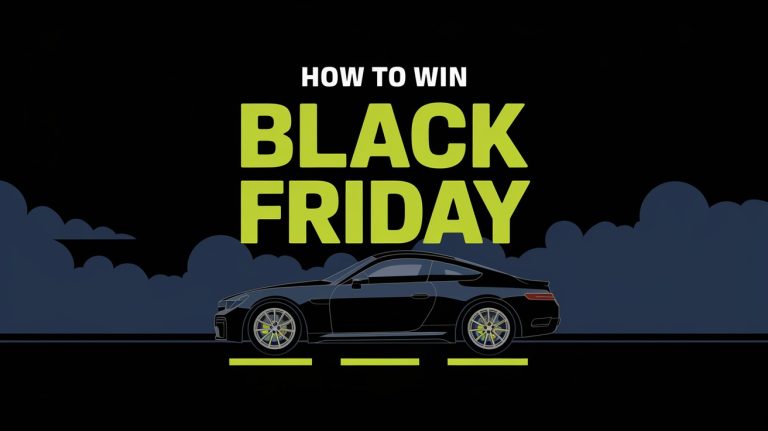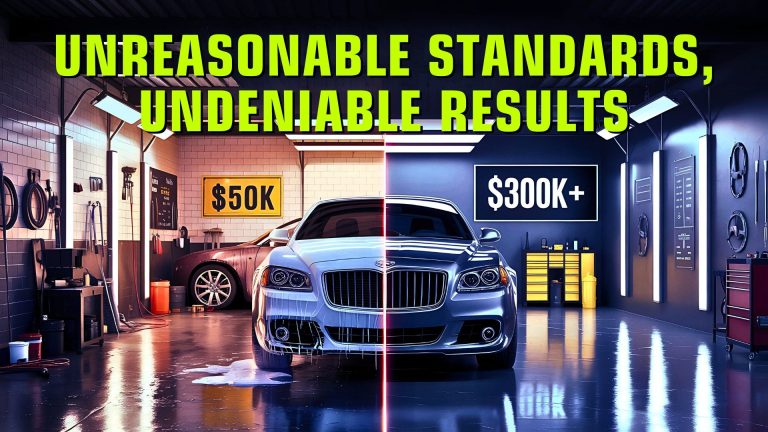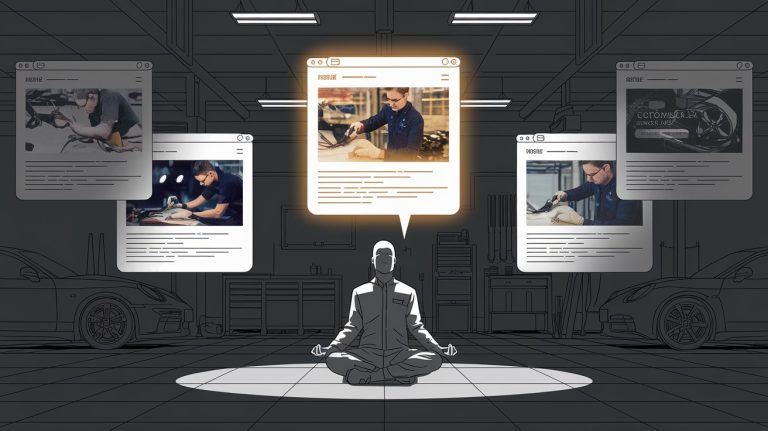The Ultimate Sales Follow-Up: The Cure To Burned Ad Spend
In this blog post, we will break down the barrier between mere interest and actual revenue. Our goal? To leave you not just with theories but with a documented follow-up process you can apply right from tomorrow.
Why Most People Fail at Sales: A Brutal Truth
Here’s a harsh reality check: If you’re not following up, you’re basically leaving money on the table. Shocking, right? But it’s true. Our experience shows that a staggering 80% of sales slip through the cracks due to inadequate follow-up. Many businesses make a fatal mistake – they reach out to potential customers just once or twice, thinking that’s enough. Spoiler alert: It’s not!
Picture this: A lead comes in, but it’s for a 1998 Prowler. Your first thought? “Nah, not worth my time.” But here’s a plot twist – what if this person is a gateway to more lucrative opportunities? What if they own a fleet of luxury cars, or their cousin is a car collector? Never judge a lead by its cover (or car, in this case). Every lead deserves the same energy and enthusiasm because, in the world of sales, surprises are always around the corner.
Now, let’s talk about the magic words: cross-sell and upsell. Yes, your lead might just want a standard service initially. But who’s to say they won’t be interested in that deluxe package or the fancy glass coating you offer? Every interaction is an opportunity to showcase your full range of services. Don’t just aim to satisfy; aim to impress and upgrade.
A Real-Life Example: The Aston Martin Story
Let me share a story that perfectly illustrates this point. We had a client who brought in a 2014 Aston Martin. You’d think they’d go for the basic package, right? Wrong! After some top-notch service and a bit of show-off on Facebook (because why not?), the client reveals their collection of cars worth $6 million. What started as a potentially low-profit job turned into a goldmine. And all it took was treating that first lead with the respect and attention it deserved.
The Big Four: Email, Phone, Text, Voicemail Drop
When it comes to following up, there’s a holy quartet you need to be using: email, phone, text, and the often-overlooked voicemail drop. It’s like a symphony – each instrument plays a crucial role, and together, they create a harmonious melody that leads to sales success.
In the dance of follow-up, the first step is always a text. Why? Because it’s quick, it’s direct, and it sets the stage for what’s to come. If they don’t bite, follow up with a call, leave a voicemail, and then hit them with an email. It’s a well-choreographed routine designed to engage your potential customer on multiple fronts.
Creating an Ecosystem of Sales Communication
Remember, it’s not about using one channel over another; it’s about creating an ecosystem where each method complements the others. Skipping any one of these is like trying to make a sandwich with only bread – sure, it’s a sandwich, but it’s not going to satisfy anyone.
Technology: Your Secret Sales Weapon
Technology is your best friend in sales. It’s the tool that allows you to reach more people more effectively. But remember, technology is just a tool – the real magic happens in the conversations you have, be it in person or through digital channels.
The ‘Buy or Die’ Mentality
Here comes a controversial yet effective approach: the ‘Buy or Die’ philosophy. It sounds aggressive, but hear me out. If a lead has expressed interest, it’s your job to pursue them relentlessly. Not in a creepy stalker way, but with persistent, professional communication. You keep knocking on that door until they’re ready to open it (or politely ask you to go away).
This approach is not for the faint-hearted. It requires a thick skin and an unshakeable belief in your product or service. But for those who can master it, it’s a game-changer. The businesses that adopt this mindset are the ones hitting six-figure sales and beyond. They’re the ones who don’t take ‘no’ for an answer and who understand that in sales, persistence pays off.
The Golden Rule of Sales: First to Five WINS
In the fast-paced world of sales, timing isn’t just a factor; it IS the factor. Here’s a golden nugget of wisdom: the first vendor to reach out to a potential client within five minutes often wins the sale. Why? Because in those crucial first minutes, the lead is hot, their interest is peaked, and they’re waiting for a response. Delay beyond this golden window, and you might as well be handing your competitors the sale on a silver platter.
The key here is developing a system that allows you to respond instantly. Whether it’s having a dedicated team member on standby or setting up automated alerts for new leads, the goal is to make contact as swiftly as possible. Remember, the early bird doesn’t just get the worm; it gets the whole darn feast.
The Impact of Broken Promises
Now, let’s talk about trust. It’s the backbone of any successful sale, and it starts with keeping your word. If you promise to call back in an hour, do it. If you say you’ll send a quote by the end of the day, make sure it’s in their inbox before they clock out. Failure to follow through on these promises not only shows a lack of professionalism but also tells the customer that their business isn’t important to you.
In a world where a single click can take a potential customer to your competitor, being known as a reliable choice can make all the difference. It’s about building a reputation. When people know they can count on you to do what you say, you’re not just closing a sale; you’re opening the door to future business and referrals.
The Art of Creative Follow-Up: Beyond the Basics
We’ve established the need for persistence, but let’s not forget the importance of creativity in your follow-up strategy. It’s not just about making calls and sending texts; it’s about how you do it. Are you just checking in, or are you providing value in every interaction? Are you sending generic messages, or are you personalizing each touchpoint?
Consider sending a short, personalized video message to your lead, showing them around your shop, or giving them a sneak peek of a similar service you provided. Share customer testimonials, before-and-after photos, or quick tips related to their interest. The goal is to engage them in a way that shows you understand their needs and are the best person to fulfill them.
The Role of CRM in Sales Automation
Automation can be a powerful tool in your sales arsenal, but it’s not a stand-alone solution. It’s meant to enhance your manual efforts, not replace them. This is where a good Customer Relationship Management (CRM) system comes into play. With the right CRM, you can automate follow-up emails, schedule reminder texts, and even set up personalized voicemail drops, all while keeping track of each interaction.
When selecting a CRM, consider your specific needs. Are you looking for something to manage long-term customer relationships post-sale, or do you need a system focused on lead generation and initial sales? Different CRMs serve different purposes, and choosing the right one can significantly impact your follow-up success.
Conclusion
In conclusion, mastering the art of follow-up in sales is a combination of persistence, creativity, and utilizing the right tools. It’s about understanding that each lead, no matter how small it might seem, has the potential to turn into a significant opportunity. It’s about building trust through reliability, engaging with personalized communication, and enhancing your efforts with technology.
Now remember, the journey of turning leads into sales is a marathon, not a sprint. It requires patience, dedication, and a willingness to adapt and learn continuously. So go ahead, apply these strategies, and watch as your follow-up game transforms your sales pipeline from lukewarm to blazing hot!
FAQs:
1: How often should I follow up with a potential customer?
The frequency of follow-up depends on the customer’s response and interest level. As a general rule, start with immediate contact, then space out your follow-ups over days or weeks, depending on their engagement. Remember, the key is persistence without being pushy.
2: What if a potential customer doesn’t respond to my follow-ups?
If a customer doesn’t respond after several attempts, it might be time to put them into a long-term nurturing campaign. This could include monthly newsletters or occasional check-ins to keep your business top-of-mind without overwhelming them.
3: How can I make my follow-up messages stand out?
Personalization is key. Address the customer by name, reference previous interactions, and tailor your message to their specific needs or interests. Adding a personal touch, like a short video message, can also make your communication more engaging and memorable.









